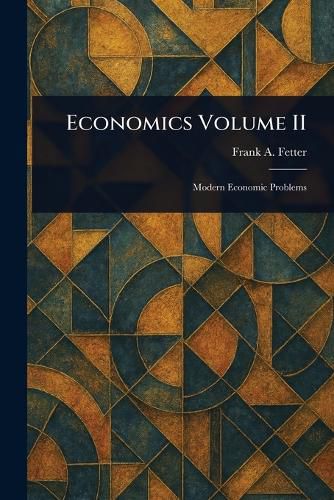Readings Newsletter
Become a Readings Member to make your shopping experience even easier.
Sign in or sign up for free!
You’re not far away from qualifying for FREE standard shipping within Australia
You’ve qualified for FREE standard shipping within Australia
The cart is loading…






This title is printed to order. This book may have been self-published. If so, we cannot guarantee the quality of the content. In the main most books will have gone through the editing process however some may not. We therefore suggest that you be aware of this before ordering this book. If in doubt check either the author or publisher’s details as we are unable to accept any returns unless they are faulty. Please contact us if you have any questions.
Explore the foundations of modern economic thought with Frank Albert Fetter's "Modern Economic Problems, Economics, Vol. 2." This carefully reprinted volume delves into the core issues shaping economic landscapes, offering insights into the complexities of capitalism, markets, and labor. Fetter, a renowned economist, presents a detailed analysis relevant to understanding economic history and development.
This book provides a valuable perspective on the historical context of economic principles. Investigate the key concepts that have shaped economic systems and continue to influence contemporary debates. Whether you are a student of economics, a history enthusiast, or simply interested in the forces that drive society, this volume offers a thought-provoking examination of enduring economic challenges. "Modern Economic Problems" remains a significant work for anyone seeking a deeper understanding of economics.
This work has been selected by scholars as being culturally important, and is part of the knowledge base of civilization as we know it.
This work is in the public domain in the United States of America, and possibly other nations. Within the United States, you may freely copy and distribute this work, as no entity (individual or corporate) has a copyright on the body of the work.
Scholars believe, and we concur, that this work is important enough to be preserved, reproduced, and made generally available to the public. We appreciate your support of the preservation process, and thank you for being an important part of keeping this knowledge alive and relevant.
$9.00 standard shipping within Australia
FREE standard shipping within Australia for orders over $100.00
Express & International shipping calculated at checkout
This title is printed to order. This book may have been self-published. If so, we cannot guarantee the quality of the content. In the main most books will have gone through the editing process however some may not. We therefore suggest that you be aware of this before ordering this book. If in doubt check either the author or publisher’s details as we are unable to accept any returns unless they are faulty. Please contact us if you have any questions.
Explore the foundations of modern economic thought with Frank Albert Fetter's "Modern Economic Problems, Economics, Vol. 2." This carefully reprinted volume delves into the core issues shaping economic landscapes, offering insights into the complexities of capitalism, markets, and labor. Fetter, a renowned economist, presents a detailed analysis relevant to understanding economic history and development.
This book provides a valuable perspective on the historical context of economic principles. Investigate the key concepts that have shaped economic systems and continue to influence contemporary debates. Whether you are a student of economics, a history enthusiast, or simply interested in the forces that drive society, this volume offers a thought-provoking examination of enduring economic challenges. "Modern Economic Problems" remains a significant work for anyone seeking a deeper understanding of economics.
This work has been selected by scholars as being culturally important, and is part of the knowledge base of civilization as we know it.
This work is in the public domain in the United States of America, and possibly other nations. Within the United States, you may freely copy and distribute this work, as no entity (individual or corporate) has a copyright on the body of the work.
Scholars believe, and we concur, that this work is important enough to be preserved, reproduced, and made generally available to the public. We appreciate your support of the preservation process, and thank you for being an important part of keeping this knowledge alive and relevant.